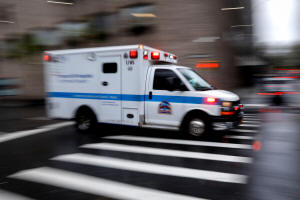New York may tap National Guard to replace unvaccinated healthcare
workers
 Send a link to a friend
Send a link to a friend
 [September 27, 2021]
By Nathan Layne [September 27, 2021]
By Nathan Layne
(Reuters) - New York Governor Kathy Hochul
is considering employing the National Guard and out-of-state medical
workers to fill hospital staffing shortages with tens of thousands of
workers possibly losing their jobs for not meeting a Monday deadline for
mandated COVID-19 vaccination.
The plan, outlined in a statement from Hochul on Saturday, would allow
her to declare a state of emergency to increase the supply of healthcare
workers to include licensed professionals from other states and
countries as well as retired nurses.
Hochul said the state was also looking at using National Guard officers
with medical training to keep hospitals and other medical facilities
adequately staffed. Some 16% of the state's 450,000 hospital staff, or
roughly 72,000 workers, have not been fully vaccinated, the governor's
office said.
The plan comes amid a broader battle between state and federal
government leaders pushing for vaccine mandates to help counter the
highly infectious Delta variant of the novel coronavirus and workers who
are against inoculation requirements, some objecting on religious
grounds.

Hochul attended the Sunday service at a large church in New York City to
ask Christians to help promote vaccines.
"I need you to be my apostles. I need you to go out and talk about it
and say, we owe this to each other," Hochul told congregants at the
Christian Cultural Center in Brooklyn, according to an official
transcript.
"Jesus taught us to love one another and how do you show that love but
to care about each other enough to say, please get the vaccine because I
love you and I want you to live."
Healthcare workers who are fired for refusing to get vaccinated will not
be eligible for unemployment insurance unless they are able to provide a
valid doctor-approved request for medical accommodation, Hochul's office
said.
It was not immediately clear how pending legal cases concerning
religious exemptions would apply to the state's plan to move ahead and
terminate unvaccinated healthcare workers.
A federal judge in Albany temporarily ordered New York state officials
to allow religious exemptions for the state-imposed vaccine mandate on
healthcare workers, which was put in place by former Governor Andrew
Cuomo and takes effect on Monday.
A requirement for New York City school teachers and staff to get
vaccinated was temporarily blocked by a U.S. appeals court just days
before it was to take effect. A hearing is set for Wednesday.
[to top of second column]
|

An ambulance arrives at the emergency entrance outside Mount Sinai
Hospital in Manhattan during the outbreak of the coronavirus disease
(COVID-19) in New York City, New York, U.S., April 13, 2020.
REUTERS/Mike Segar/File Photo

The highly transmissible Delta variant has driven a
surge in COVID-19 cases and hospitalizations in the United States
that peaked in early September and has since fallen, according to a
Reuters tally. Deaths, a lagging indicator, continue to rise with
the nation reporting about 2,000 lives lost on average a day for the
past week, mostly in the unvaccinated.
While nationally cases are down about 25% from their autumn peak,
rising new infections in New York have only recently leveled off,
according to a Reuters tally.
In an attempt to better protect the most vulnerable, the CDC on
Friday backed a booster shot of the Pfizer-BioNTech COVID-19 vaccine
for Americans aged 65 and older, adults with underlying medical
conditions and adults in high-risk working and institutional
settings.
On Sunday, CDC Director Dr. Rochelle Walensky fleshed out who should
be eligible for the booster shots based on their work in high-risk
settings.
"That includes people in homeless shelters, people in group homes,
people in prisons, but also importantly, our people who work...with
vulnerable communities," Walensky said during a TV interview. "So
our health care workers, our teachers, our grocery workers, our
public transportation employees."
Walensky decided to include a broader range of people than was
recommended on Thursday by a group of expert outside advisers to the
agency. The CDC director is not obliged to follow the advice of the
panel.
(Reporting by Nathan Layne in Wilton, Connecticut and Mike Stone in
Washington; Editing by Lisa Shumaker)
[© 2021 Thomson Reuters. All rights
reserved.] Copyright 2021 Reuters. All rights reserved. This material may not be published,
broadcast, rewritten or redistributed.
Thompson Reuters is solely responsible for this content.
 |